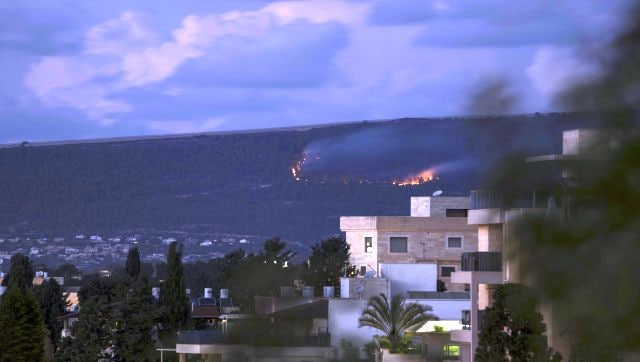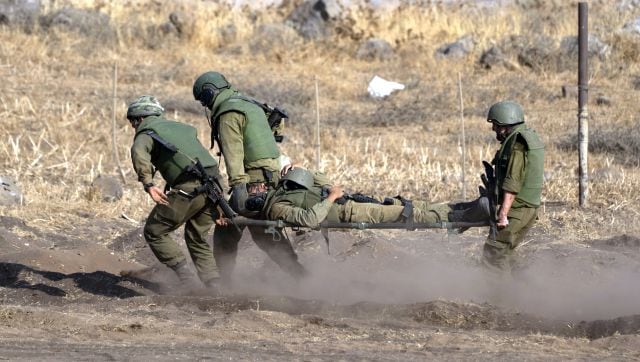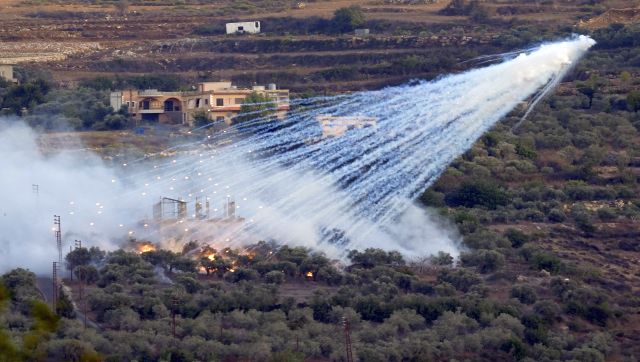The Israel-Hamas war is being fought miles and miles away. But India is keeping a close watch on the ongoing battle, as fears loom that it will widen into a larger conflict in the West Asia region. There’s another reason that India is wary. Indian troops have been deployed to the southern border of Lebanon where tensions have escalated due to firing between Hezbollah and the Israeli army. But what are Indian troops doing at the Lebanon border? Moreover, why are Israel and Lebanon exchanging fire amid the war? We take a closer look and the situation and give you the answers. Indians at the Lebanon border There are around 900 Indians who have been deployed at the Israel-Lebanon border as part of the UN Interim Force in Lebanon (UNIFIL). There’s also another 200 Indian soldiers deployed as part of the UN Disengagement Force (UNDOF) at Golan Heights between Israel and Syria. The Indian troops in the UNIFIL are stationed at the 110-km-long Blue Line, which has witnessed fierce confrontations between Israel and Hezbollah forces in the past. In fact, the UN force comprising Indian troops have been dispatched at the region since 1978, making it clear that the ‘interim’ doesn’t mean short-term deployment. Earlier on Sunday, the UN peacekeeping force reported that a rocket shell had fallen on its site in southern Lebanon, with no casualties reported. UNIFIL spokesman Andrea Tenenti said in a brief statement that a rocket shell fell on a site of the UNIFIL peacekeeping mission in southern Lebanon, without providing further details. [caption id=“attachment_13253332” align=“alignnone” width=“640”] A fire burns on the Israeli side of the border with Lebanon following explosions, Sunday. AP[/caption] Lebanese prime minister Najib Mikati made a call to the UNIFIL Commander-in-Chief Gen Aroldo Lazaro, inquiring about the circumstances of a missile landing at the location of UN forces in Naqoura. According to a statement issued by Mikati’s office, he stressed “full solidarity with UNIFIL.” Tensions running high at Lebanon border Since Israel took the war to Hamas following the horrific attack on 7 October, the border between Israel and Lebanon has also seen an escalation in violence. Last Monday (9 October), a senior Israeli officer was killed in a confrontation with militants on the frontier. The Israel Defense Forces (IDF) said that the troops and aircraft killed two “terrorist infiltrators” who had crossed into Israeli territory. The Gaza Strip-based Palestinian Islamic Jihad terror group claimed responsibility for the armed infiltration on its Telegram channel, saying this was part of the ongoing war between Israel and terror groups in Gaza. The incident took place near the northern Bedouin Israeli town of Arab al-Aramshe and the Lebanese village of Dhayra. The following day (10 October), Hezbollah, who has extended support to Hamas, fired a guided missile at an Israeli military vehicle. Israel retaliated by hitting a Hezbollah observation post. [caption id=“attachment_13253352” align=“alignnone” width=“640”]
A fire burns on the Israeli side of the border with Lebanon following explosions, Sunday. AP[/caption] Lebanese prime minister Najib Mikati made a call to the UNIFIL Commander-in-Chief Gen Aroldo Lazaro, inquiring about the circumstances of a missile landing at the location of UN forces in Naqoura. According to a statement issued by Mikati’s office, he stressed “full solidarity with UNIFIL.” Tensions running high at Lebanon border Since Israel took the war to Hamas following the horrific attack on 7 October, the border between Israel and Lebanon has also seen an escalation in violence. Last Monday (9 October), a senior Israeli officer was killed in a confrontation with militants on the frontier. The Israel Defense Forces (IDF) said that the troops and aircraft killed two “terrorist infiltrators” who had crossed into Israeli territory. The Gaza Strip-based Palestinian Islamic Jihad terror group claimed responsibility for the armed infiltration on its Telegram channel, saying this was part of the ongoing war between Israel and terror groups in Gaza. The incident took place near the northern Bedouin Israeli town of Arab al-Aramshe and the Lebanese village of Dhayra. The following day (10 October), Hezbollah, who has extended support to Hamas, fired a guided missile at an Israeli military vehicle. Israel retaliated by hitting a Hezbollah observation post. [caption id=“attachment_13253352” align=“alignnone” width=“640”] Lebanese army soldiers stand guard as they face the Israeli town of Metula, background, in the southern border village of Kfar Kila, Lebanon. AP[/caption] Later, on 13 October, it was reported that the IDF had warned residents of a village near the Lebanese border to hole up at home and lock doors and windows, saying a suspected armed infiltration was under way and that it was responding with artillery fire into Lebanon. The alert took place in Hanita, 500 metres from the border and opposite the Lebanese community of Aalma El-Chaeb. Heiko Wimmen, an analyst with the International Crisis Group, commenting on the cross-border action was quoted by France24 as saying: “The situation on the border is extremely dangerous.” While individual clashes there may represent just “one notch up on the escalation ladder,” such details “matter hugely,” he said on X. The firing has led to about a dozen deaths on the Lebanese side, most of them combatants but also a Reuters journalist and two civilians. Meantime, at least two people have been killed in Israel. [caption id=“attachment_13253372” align=“alignnone” width=“640”]
Lebanese army soldiers stand guard as they face the Israeli town of Metula, background, in the southern border village of Kfar Kila, Lebanon. AP[/caption] Later, on 13 October, it was reported that the IDF had warned residents of a village near the Lebanese border to hole up at home and lock doors and windows, saying a suspected armed infiltration was under way and that it was responding with artillery fire into Lebanon. The alert took place in Hanita, 500 metres from the border and opposite the Lebanese community of Aalma El-Chaeb. Heiko Wimmen, an analyst with the International Crisis Group, commenting on the cross-border action was quoted by France24 as saying: “The situation on the border is extremely dangerous.” While individual clashes there may represent just “one notch up on the escalation ladder,” such details “matter hugely,” he said on X. The firing has led to about a dozen deaths on the Lebanese side, most of them combatants but also a Reuters journalist and two civilians. Meantime, at least two people have been killed in Israel. [caption id=“attachment_13253372” align=“alignnone” width=“640”] Israeli soldiers carry a soldier on a stretcher during a drill as Israeli forces are stationed near the border with Lebanon, in Israel. AP[/caption] Israel’s defence minister Yoav Gallant said on Sunday that Israel has no interest in waging war on its northern front and that if Hezbollah restrains itself then Israel will keep the situation along the border as it is. “We have no interest in a war in the north. We don’t want to escalate the situation,” Defence Minister Yoav Gallant told reporters. “If Hezbollah chooses the path of war, it will pay a very heavy price. Very heavy. But if it restrains itself, we will respect that and keep the situation as it is,” Gallant said.
Israeli soldiers carry a soldier on a stretcher during a drill as Israeli forces are stationed near the border with Lebanon, in Israel. AP[/caption] Israel’s defence minister Yoav Gallant said on Sunday that Israel has no interest in waging war on its northern front and that if Hezbollah restrains itself then Israel will keep the situation along the border as it is. “We have no interest in a war in the north. We don’t want to escalate the situation,” Defence Minister Yoav Gallant told reporters. “If Hezbollah chooses the path of war, it will pay a very heavy price. Very heavy. But if it restrains itself, we will respect that and keep the situation as it is,” Gallant said.
Israel-Hamas war: Related coverage Another conflict looms large? How tensions along the Israel-Lebanon border are rising ‘If we bathe, we won’t drink’: How Gazans are deprived of water amid war Has Israel used white phosphorus in Gaza? What’s this toxic chemical? Can Israel permanently dismantle Hamas by invading Gaza? Who can broker peace between Israel, Hamas? Can India help? How a drawn-out Israel-Hamas war could hurt the Indian economy
India’s role in UN peacekeeping India has maintained a firm commitment to UN peacekeeping forces since 1948. In fact, India is the fifth highest amongst troop-contributing countries. To date, India has contributed more than 2,60,000 Indians to the various peacekeeping missions across the world. Even today, 5,800 Indian peacekeepers serve in conflict-ridden areas in Africa and Asia. India’s contribution to the UN peacekeeping forces began with its participation in the UN operation in the 1950s, where India’s mediatory role in resolving the stalemate over prisoners of war in Korea led to the signing of the armistice that ended the Korean War. In 2022, the UN peacekeeping forces saw a total death toll of 4,207, with India seeing the highest number of fatalities. The UN reported that in 2022 India had suffered 175 fatalities), followed by Pakistan (166) and Bangladesh (160). In January, India deployed a platoon of Women Peacekeepers in Sudan’s Abyei region as part of the Indian Battalion in the United Nations Interim Security Force (UNISFA). With inputs from agencies
)